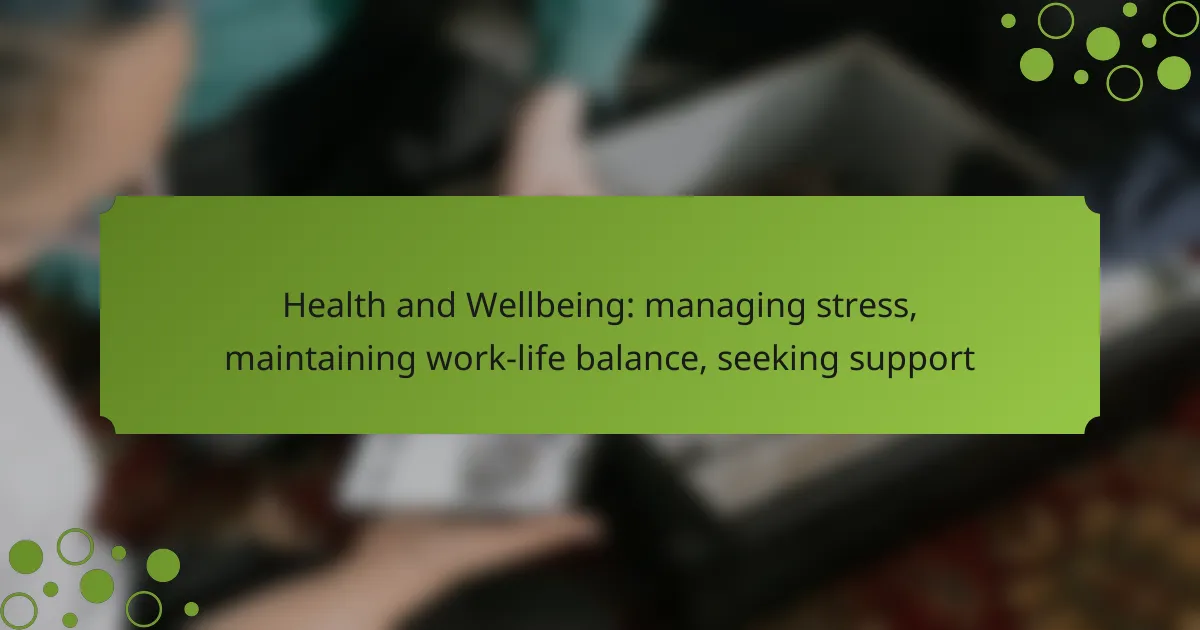
In today’s fast-paced world, managing stress and maintaining a healthy work-life balance are essential for overall well-being. By identifying stressors and employing techniques such as mindfulness and physical activity, individuals can cultivate resilience. Additionally, setting clear boundaries and prioritizing self-care can significantly enhance both personal and professional satisfaction. Seeking support through various channels can further empower individuals to navigate their stress effectively.
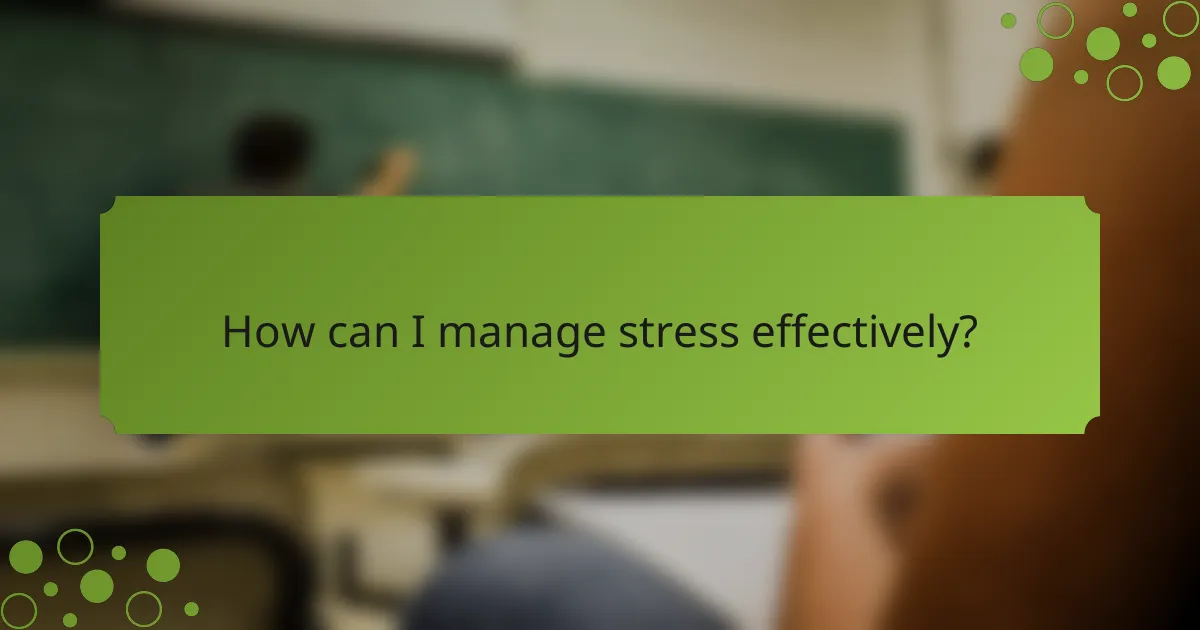
How can I manage stress effectively?
Managing stress effectively involves identifying stressors and employing techniques to mitigate their impact. Strategies like mindfulness, physical activity, and therapy can help maintain a balanced response to stressors in daily life.
Mindfulness meditation techniques
Mindfulness meditation techniques focus on being present and fully engaging with the moment. Practices such as body scans, guided imagery, or simply observing your breath can enhance awareness and reduce anxiety.
To start, set aside 5-10 minutes daily in a quiet space. Sit comfortably, close your eyes, and concentrate on your breathing. If your mind wanders, gently bring your focus back to your breath without judgment.
Physical exercise routines
Regular physical exercise is a powerful tool for managing stress. Activities like walking, jogging, cycling, or yoga can release endorphins, which improve mood and reduce tension.
Aim for at least 150 minutes of moderate aerobic activity each week, such as brisk walking or swimming. Incorporating strength training twice a week can also enhance overall well-being and resilience to stress.
Cognitive Behavioral Therapy (CBT)
Cognitive Behavioral Therapy (CBT) is an effective approach for managing stress by changing negative thought patterns. It helps individuals identify irrational beliefs and replace them with more constructive thoughts.
Consider seeking a licensed therapist trained in CBT. Sessions typically involve discussing specific stressors and developing coping strategies, which can lead to significant improvements in stress management over time.
Breathing exercises
Breathing exercises are simple yet effective methods for reducing stress. Techniques such as diaphragmatic breathing or the 4-7-8 method can help calm the nervous system and promote relaxation.
To practice the 4-7-8 technique, inhale deeply through your nose for 4 seconds, hold your breath for 7 seconds, and exhale slowly through your mouth for 8 seconds. Repeat this cycle 4-5 times to experience its calming effects.
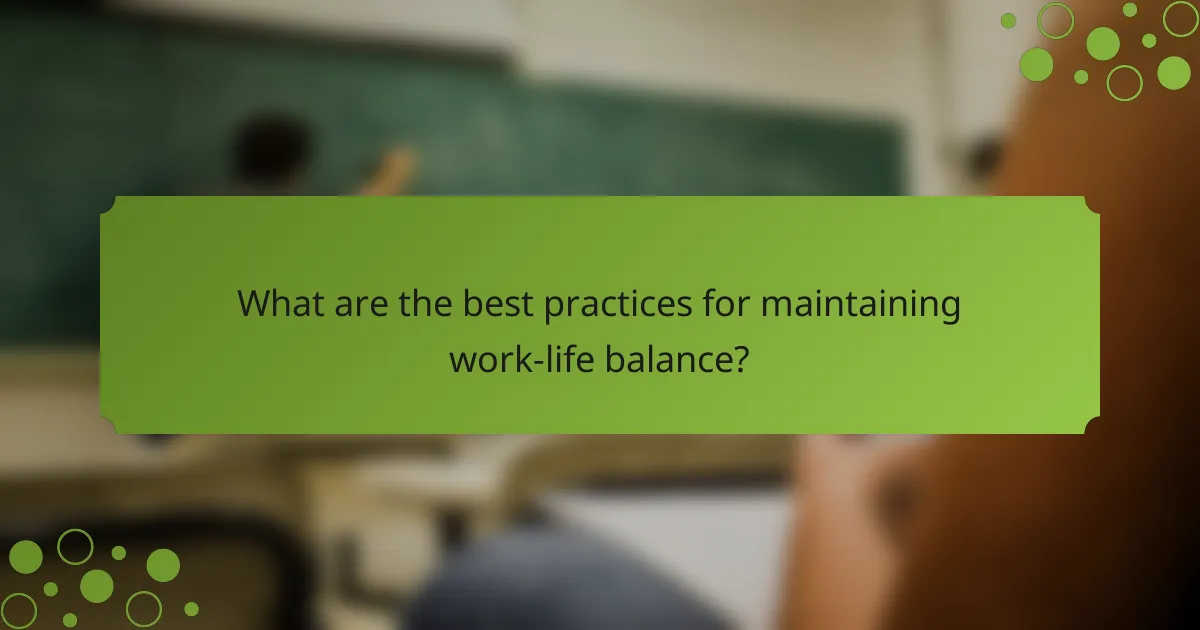
What are the best practices for maintaining work-life balance?
Maintaining work-life balance involves effectively managing your time, setting clear boundaries, and prioritizing self-care. These practices help reduce stress and enhance overall well-being, allowing you to thrive both personally and professionally.
Time management strategies
Effective time management is crucial for achieving a healthy work-life balance. Techniques such as the Pomodoro Technique, where you work in focused bursts followed by short breaks, can enhance productivity. Additionally, using tools like calendars or task management apps can help you allocate time for both work and personal activities.
Consider prioritizing tasks based on urgency and importance. A common approach is the Eisenhower Matrix, which categorizes tasks into four quadrants to help you focus on what truly matters. This method can prevent overwhelm and ensure that you dedicate time to essential responsibilities.
Setting boundaries with work
Setting clear boundaries with work is essential for maintaining a healthy balance. This includes defining specific work hours and communicating them to colleagues and supervisors. By doing so, you can create a clear distinction between work time and personal time, reducing the likelihood of burnout.
Be mindful of technology’s role in blurring these boundaries. Consider implementing “no work” zones, such as during family meals or personal time, to help you disconnect and recharge. Establishing these limits can foster a more fulfilling personal life while still meeting professional obligations.
Prioritizing self-care activities
Prioritizing self-care is vital for sustaining work-life balance. Activities such as exercise, meditation, and hobbies can significantly reduce stress and improve mental health. Aim to incorporate at least 30 minutes of physical activity into your daily routine, as this can enhance mood and energy levels.
Additionally, make time for relaxation and social connections. Engaging with friends and family or pursuing interests outside of work can provide a necessary break and rejuvenate your spirit. Remember, self-care is not a luxury but a necessity for maintaining balance and overall well-being.
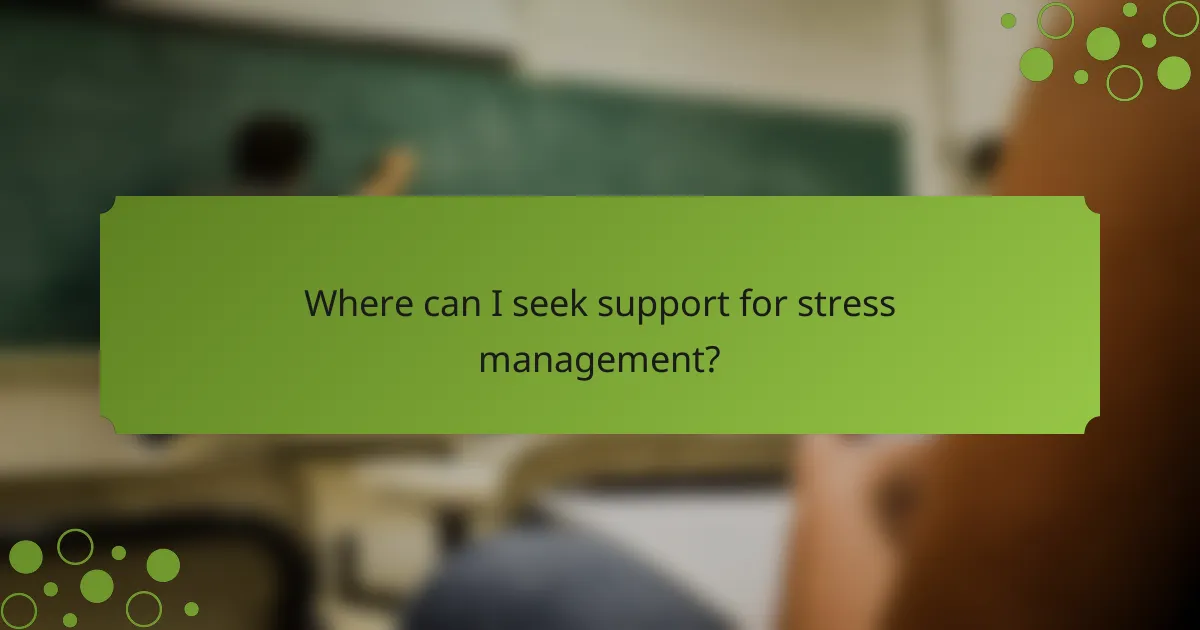
Where can I seek support for stress management?
Support for stress management can be found through various channels, including online therapy platforms, local support groups, and Employee Assistance Programs (EAPs). Each option offers unique benefits and accessibility, allowing individuals to choose what best fits their needs.
Online therapy platforms like BetterHelp
Online therapy platforms, such as BetterHelp, provide convenient access to licensed therapists through video calls, messaging, or phone sessions. This flexibility allows individuals to seek help from the comfort of their homes, making it easier to fit therapy into busy schedules.
When considering an online platform, look for features like subscription costs, therapist qualifications, and the availability of specialized services. Many platforms offer a free trial or a money-back guarantee, enabling you to assess their suitability without a long-term commitment.
Support groups in local communities
Local support groups offer a space for individuals to share experiences and coping strategies in a group setting. These gatherings can be found through community centers, hospitals, or mental health organizations, often at no cost.
Joining a support group can foster a sense of belonging and reduce feelings of isolation. It’s important to find a group that aligns with your specific stressors, whether they relate to work, family, or other life challenges.
Employee Assistance Programs (EAPs)
Employee Assistance Programs (EAPs) are employer-sponsored services that provide confidential support for employees facing personal or work-related issues, including stress management. EAPs typically offer counseling sessions, resources, and referrals at no cost to employees.
To utilize an EAP, check your employee handbook or speak with your HR department for details on available services. Many EAPs allow you to access support quickly, often within days, making them a valuable resource for immediate assistance.
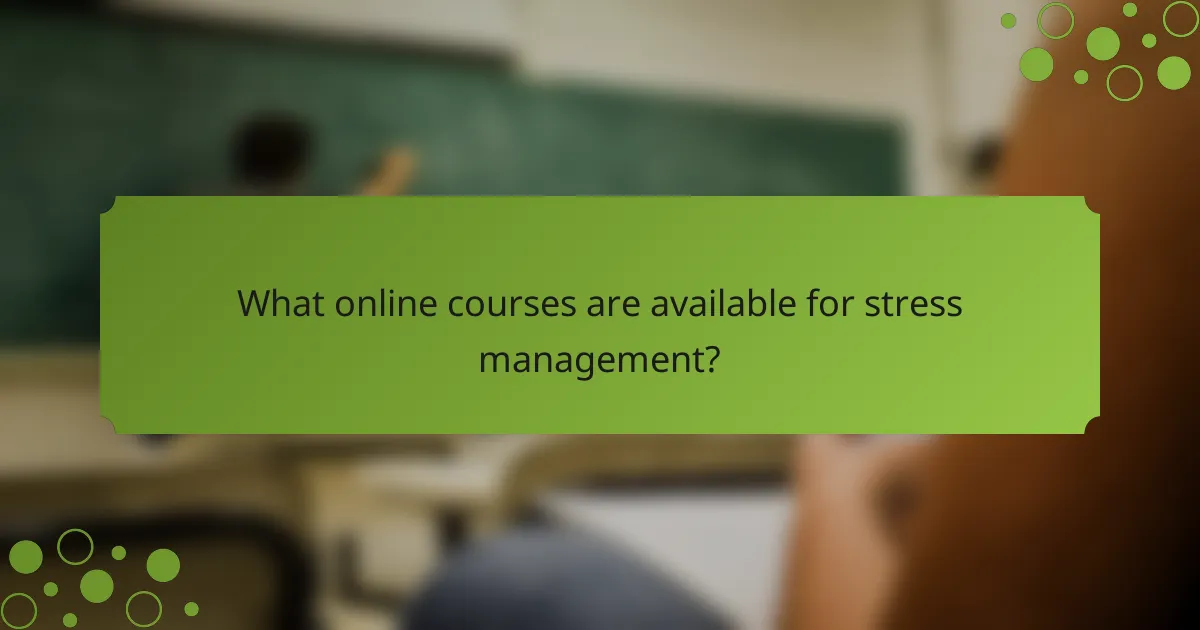
What online courses are available for stress management?
Numerous online courses focus on stress management, offering practical techniques to help individuals cope with daily pressures. These courses often cover various strategies, including mindfulness, time management, and emotional resilience.
Mindfulness-based stress reduction courses
Mindfulness-based stress reduction (MBSR) courses teach participants to focus on the present moment, helping to reduce anxiety and improve overall well-being. Typically lasting eight weeks, these programs include guided meditations, yoga, and group discussions to foster a supportive environment.
When selecting an MBSR course, consider the instructor’s qualifications and the course format, whether live or pre-recorded. Many programs are available online, making them accessible regardless of location.
Work-life balance workshops
Work-life balance workshops aim to equip participants with tools to manage their professional and personal lives effectively. These workshops often cover time management techniques, setting boundaries, and prioritizing self-care, which can significantly reduce stress levels.
Look for workshops that offer practical exercises and real-life scenarios to help you apply the concepts learned. Many organizations provide these workshops online, allowing for flexible participation. Consider checking local community centers or professional organizations for options that may be available at little to no cost.
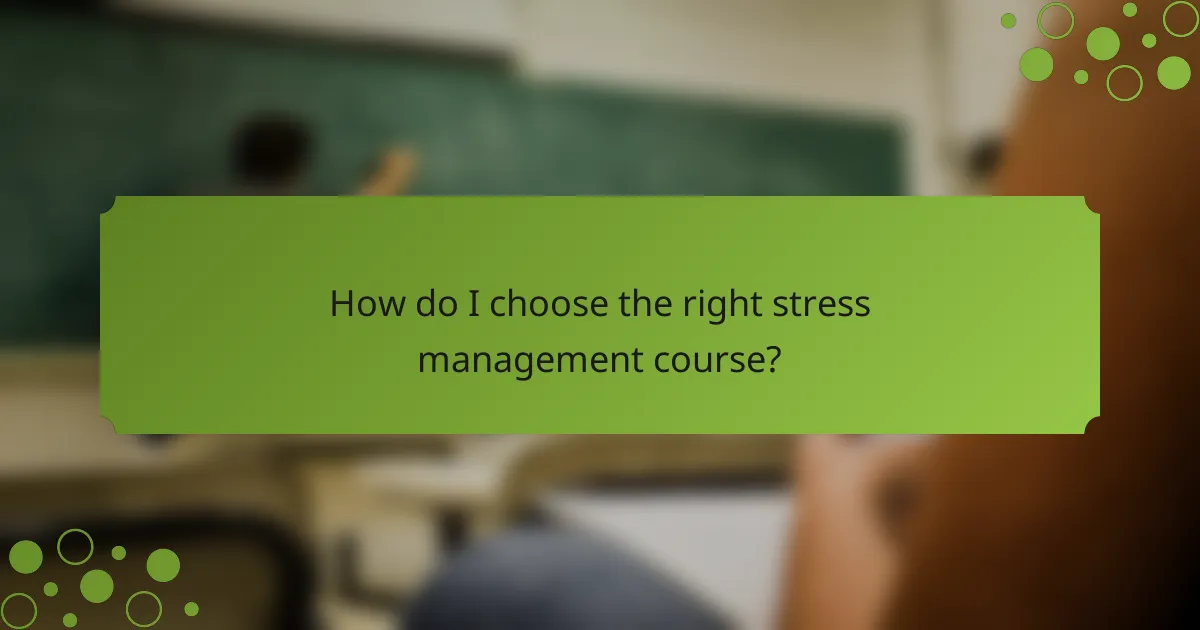
How do I choose the right stress management course?
Choosing the right stress management course involves assessing the course content, objectives, and the qualifications of the instructor. Look for programs that align with your specific needs and offer practical strategies for managing stress effectively.
Evaluating course content and objectives
When evaluating course content, consider what topics are covered and how they relate to your stress management goals. Look for courses that include techniques such as mindfulness, cognitive-behavioral strategies, and relaxation methods.
Check if the course provides clear objectives that outline what you will learn and how it will help you manage stress. A well-structured course should offer a mix of theoretical knowledge and practical applications, ensuring you can implement what you learn in real-life situations.
Checking instructor credentials
Instructor credentials are crucial in selecting a stress management course. Ensure the instructor has relevant qualifications, such as degrees in psychology, counseling, or social work, along with certifications in stress management techniques.
Experience matters as well. Look for instructors who have a proven track record in teaching stress management or have practical experience in mental health. Reading reviews or testimonials from past students can also provide insight into the instructor’s effectiveness and teaching style.
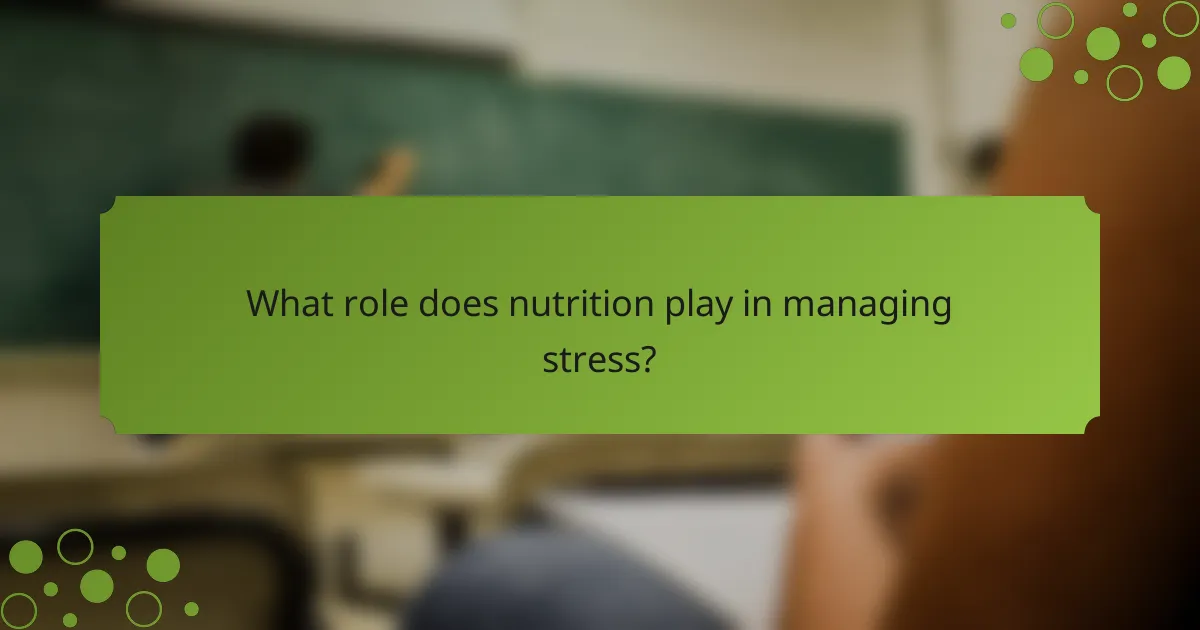
What role does nutrition play in managing stress?
Nutrition plays a crucial role in managing stress by influencing hormone levels and overall mood. A balanced diet rich in specific nutrients can help mitigate stress responses and improve emotional resilience.
Foods that reduce stress hormones
Certain foods can help lower stress hormones like cortisol. For example, dark chocolate, fatty fish, and leafy greens are known to support brain health and reduce anxiety. Incorporating these foods into your diet can promote a calmer state of mind.
Additionally, foods high in antioxidants, such as berries and nuts, can combat oxidative stress, further aiding in stress management. Aim to include a variety of these foods in your daily meals for optimal benefits.
Hydration and its effects on mood
Staying hydrated is essential for maintaining a stable mood and reducing stress. Even mild dehydration can lead to irritability and increased anxiety levels. Aim for at least 2 liters of water daily, adjusting based on activity levels and climate.
Incorporating hydrating foods, like fruits and vegetables, can also contribute to your overall fluid intake. Be mindful of your hydration habits, especially during stressful periods, to support your mental well-being.


